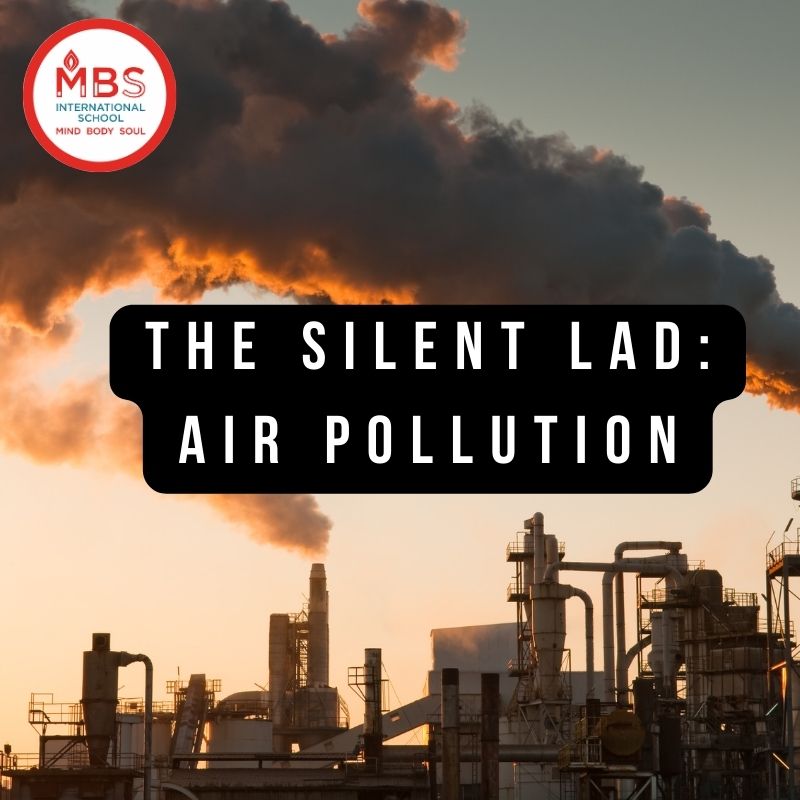The Silent Lad: Air Pollution
posted on Nov 10, 2023
"The Silent Lad explores the insidious impact of air pollution on health and the environment. Unseen and often underestimated, this silent killer demands our attention for a healthier future."

The Silent Lad : Air pollution
When winter comes, the weather in Delhi becomes bad.
No one is aware of the situation.
Air pollution is always present in the air but is not always obvious to the naked eye.
Poor air quality affects the health of children, the elderly and other vulnerable people. When you breathe polluted air, you experience physical discomfort and irritation, which can negatively affect your health.
Current Phase of Situation
Current Situation Delhi's air quality is deteriorating day by day.
The capital's Air Quality Index (AQI) is currently in the "severe" category, with an AQI of more than 400.
As thick toxic smog hangs over the city for the fifth day in a row, doctors are expressing concern over the increase in air pollution and eye problems due to air pollution. This also means that the threat is back and you should be very worried. This year the risk is greater, the danger is greater.
Irritating Causes
The main cause of severe weather conditions in northern India is stone burning by farmers in the states of Punjab and Haryana. But air pollution from burning crops has become a concern, especially in the last seven or eight years.
But farmers in Punjab and elsewhere have been burning crop residues for centuries to clear their fields of kharif crops.
So why has it become a cause of air pollution in recent years? Has anything changed?
Yes, kharif crop stubble has been burned since ancient times, but the blow of the retreating monsoon rains to the Bay of Bengal quickly removes the pollution before it affects northern India.
However, the planting, harvesting and burning cycle was delayed by a month due to bad weather; for when the crops were burned at the end of October, the wind had completely changed and the monsoon rains had not retreated.
Doctors and health experts explain the dangers of bad weather to general health, saying it can cause mental and emotional damage and cause stress at all ages if not prevented.
Here are some damages that could be pretty scary, according to new research.
Respiratory problems
Children's respiratory systems are particularly sensitive to pollution problems. Fine aerosols (PM2.5) and nitrogen dioxide can penetrate deep into the lungs and cause serious diseases such as asthma and pneumonia.
Neurological Effects
Recent studies have shown a relationship between air pollution and adverse effects on children. Exposure to contaminants such as lead and mercury has been associated with cognitive impairment and effects on learning and development.
The number of patients suffering from respiratory problems and difficulty breathing in hospitals in Delhi has increased in the last few days, doctors said.
As air pollution poses a serious threat to human health, there is an urgent need for sustainable measures to reduce air pollution in the region.
In addition to chronic cough, shortness of breath, sore throat, and chest tightness, patients also complain of anxiety, confusion, and irritability. This pollution is a serious problem that must be solved as soon as possible. Every winter bad weather falls to a bad level and there is much discussion but no definitive study. All hopes are from the government.
Carefully monitoring all air quality standards and making efforts to prevent deterioration of air quality in the region, falls under GRAP "Severe Air Quality (AQI 450 in Delhi) Phase 4 with immediate effect across the National Capital Region".
6 Point Action Plan for Implementation of GRAP Phase 4: -
1. Ban on registration of medium and heavy goods vehicles in Delhi, except essential/service vehicles. 444
2. Highways, roads, intersections, overpasses, transmission lines, water pipes, etc. End the construction and demolition of public works.
3. Consider replacing offline courses with online courses.
4. Consider offering online training.
5. Public, municipal and private offices are allowed to operate at 50% capacity, the rest are allowed to work at home.
5. The Central Government has decided to allow employees in Central Government organizations to work from home.
6. The state government is exploring emergency measures such as closing colleges/schools and imposing restrictions on non-essential businesses based on code numbers and even cars. added that people, especially children, the elderly and those in poor health, should reduce outdoor activities and stay indoors